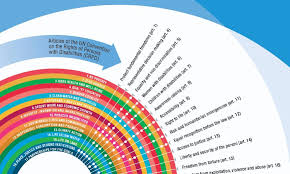By Raji Ade oba
At the beginning of the 21st century, the world, through the Millennium Summit of the United Nations’ Organizations formulated eight visions for the year 2015.
Headed and financed by the World Bank Organization, these were monumental and mammoth goals that required deep, complex, and overarching policies to come to fruition. However, the World had failed big in including hundreds of millions of people with disabilities in Africa’s most populous country and around the world.
A total of 191 United Nations member states and no fewer than 22 international organizations, including the IMF and the World Bank, committed to helping accomplish the Millennium Development Goals by 2015:
The Millennium Development Goals was drafted by the United Nations (UN) at the Millennium World Summit in the year 2000. They included eight goals that were aimed at achieving what they believed to be sustainable development in both middle income and poor nations:
The MDSs for the year 2015 include:
- Eradicating poverty
- Achieving universal primary education
- Stimulating gender equality
- Empowering women
- Decreasing child mortality
- Promoting maternal health
- Fighting HIV/AIDS, malaria, and associated diseases
- Safeguarding environmental sustainability, and,
- Increasing a global partnership for development.
The ambitious and compassionate as the MDGs were, As well, the World Bank, year after year, has shown a remarkable commitment to the Millennium Development Goals because, according to the World Bank, “these goals are our goals” (OECD,1996).
Per the major set deadline, there were not many of the goals achieved. There was, however, a slight decrease in the percentage of the goals indicating an achievable cause.
Upon a harder reflection, however, the MDGs failed to consider an extremely consequential phenomenon in the world today, which includes INCLUSION.
Inclusion is key to the future mobility of the world. Why aren’t we talking about what we do want to accomplish for people with disabilities around the world? What about the millions of vulnerable and internally displaced individuals in Nigeria (the country where I am from)? –which is why the list cannot stay the same.
The 2015 MDGs need modifications to reflect the world’s true humanity in these volatile times. I believe the MDGs of 2015 under-emphasize inclusion and participation, and empowerment for all people with disabilities, including vulnerable individuals all over the world.
Given the pervasive social and institutional challenges confronting the average individual with disabilities in Nigeria, including denigration, stigmatization, poor socio-economic opportunities, poor access to quality education, and difficulties engaging within the larger, non-disabled society, often constituting significant harm and consequences, the World Bank can be the bellwether in addressing these challenges for the collective development of the world.
If the world wants peace and security, including prosperity, it should formulate a disability inclusion goal for the hundreds of millions of people with disabilities worldwide.
Researchers and stakeholders in the disability community in Nigeria consistently express concerns about the current trajectory of people with disabilities.
One, people with disabilities, because of lack of disability-related technical and human supports, experience stigma and discrimination, and consequently physical and emotional abuse, constituting significant safeguarding issues and governance for Deaf Leaders and Stakeholders.
Two, Deaf female adolescents, for example, are susceptible to early pregnancy, poor reproductive choices, and dropout. Three, male adolescents with disabilities are prone to significant social vices and delinquencies that may have even more far-reaching consequences than those of their non-disabled fellows.
Fact is, the effect of disability permeates all areas of the life of people with disabilities, ranging from the poverty of communication to poor knowledge acquisition in society. This leaves us among the most vulnerable groups, creating severe safeguarding issues and governance. Ultimately, the World, including the United Nations has a responsibility to make goals and formulate policies on these protection issues and administration.
The future of our world is going to be determined by our capacity to band together, to form interlocking clusters of compassionate and inclusive people with creativity to make our world better than we found it.


